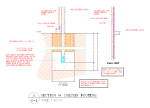Registered Design Professionals and Building Officials please weigh in on this one. Is hiring an engineer terrible advice?
In a Facebook ‘Barndominium Living’ discussion group this was posted:
“Curious as to how many of you consulted an engineer before building (for concrete and steel framing) or simply went with your welder’s design?”
First response, from a fellow group member, was:
“Most metal building manufacturers have engineers on staff as part of the design process.”
Original poster replied:
“Yes, when getting quotes directly from them we understood it would have an engineered stamp. We have chosen not to do bolt up, so the welders we have talked to would just order the metal and do their own design.”
Here is where I stepped in:
“Regardless of what type of building system you decide upon, please please please have plans sealed by a Registered Design Professional (architect or engineer).”
Now this next poster may be suffering from Dunning-Kruger Effect (poor grammar in his post left for lack of clarity) (https://www.hansenpolebuildings.com/2015/01/dunning-kruger-effect/):
“That’s some terrible advice you have given here. Plenty of builders that do a great job without the extra cost of a architect or engineer.”

My retort went something like this:
And why would it be terrible to insure every component and connection meets structural requirements? A building is only as strong as its weakest link and unless this “great job” builder is capable of running all structural calculations for a particular building, there exists a possibility of an under design.
There are also insurance companies giving discounts for having an engineered building.
I am not a RDP and I make no money promoting use of them. I do care deeply about properly structural designed buildings – any failure, especially of a barndominium to be used as a home, makes all of us – even those who do it right look bad.
Hopefully this article will generate some thoughtful responses.










Let me preface this by saying that I am a RDP.
To me, the type and size of the project (and local codes) will dictate whether a RDP should be involved. If you are going to build a 24’x36′ stick built garage I would say follow the prescriptive requirements that are in the IRC, you don’t need my services.
But that’s just it, the IRC is a prescriptive code, essentially it says build exactly like this and it will be adequate as long as your building meets the criteria of size, height, etc. Often (not always) prescriptive codes are very conservative because they act as a cover all, they don’t apply to each specific situation. That means, in reality, it is costing more in material and labor to build to a prescriptive code. For a small garage this cost won’t be enough to offset the cost of an RDP so it doesn’t make sense. For a large project, an RDP can actually run calcs for the specific situation, building, and location. This will result in a design that is much more economical than a prescriptive code would have allowed for. Plus, you get the added guarantee that it is all designed to be structurally sound for all anticipated loads.
When you get into the realm of buildings that don’t really fall under prescriptive codes such as post frame buildings and steel buildings I would absolutely want it to be designed and engineered by an RDP. And honestly this is as much because I want it to be built economically as I want it to be built soundly. Some contractors will skimp and under build while others will overbuild. Let the RDP do their job and the contractor (or diy’er) do their’s and the result is a good thing.
A RDP should be involved in the design and approval process. The issue is more about who engages the RDP.
My experience with RDPs is when the owner hires them, the RDP draws up what he is used to doing, then the contractor prices his design.
At this point, the personalities of the parities involved come in to play. The contractor can often say “I can do this part another way for less money”, at which point the RDP may take offence because his design is being questioned to his customer(the owner). The RDP is also looking at additional labor(and likely cost to the owner) to verify the contractor’s proposals. The ensuing adversarial relationship can create friction that lasts the entire job.
A contractor that is designing and/or fabricating in-house would serve the owner better if the contractor engages the RDP. The contractor’s designs then get approved (or modified) to the RDP’s satisfaction without the owner arbitrating (and paying for) disputes. This will still get the owner a building signed off by a RDP, that also meets the contractor’s preferred construction methods.
I have worked with general contractors many years (in commercial work) where they had RDPs that they regularly worked with, including myself (or were in-house). This system works well, the owner only has to deal with the contractor, and the contractor is responsible for all regulatory approvals.
I agree in it being much more practical to work with a supplier who engages the RDP.